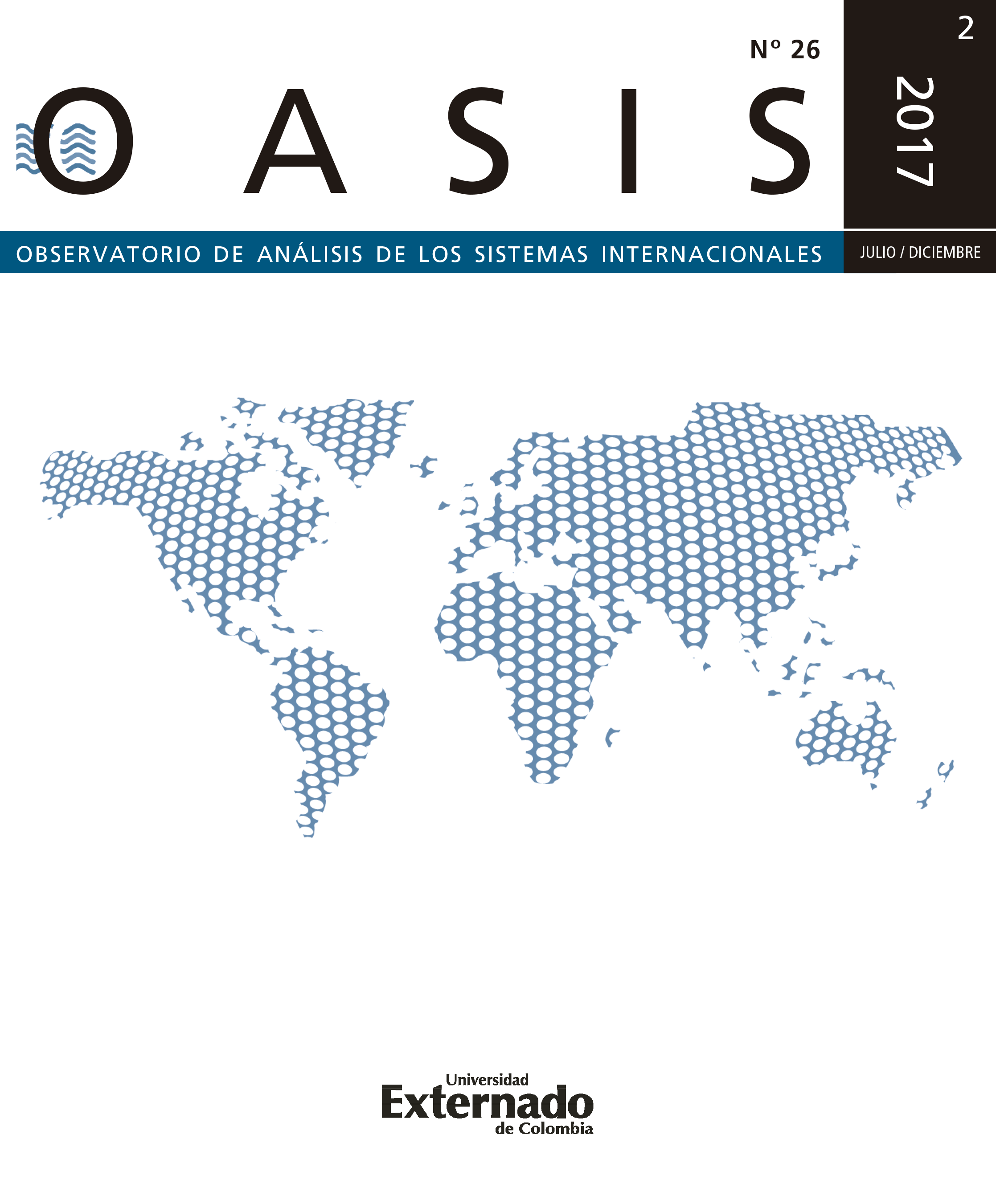Inequality, Social Protests and Civil War
Inequality, Social Protests and Civil War
Contenido principal del artículo
Resumen
The following article presents a series of hypotheses to analyze the possible transitions between protest and civil war and their relation to inequality. To do so, the article presents an analysis on the emergence of protests and its relation with the increase in inequality across the world. This increase in inequality can in fact lead to social unrest, instability and in some cases facilitate the emergence of future armed conflicts. Thus this scenario of increased inequality presents different possible trajectories: 1) protest generated by inequality can escalate into civil conflicts and civil war, or 2) protest generated by inequality can facilitate processes of participation and democratic consolidation. The possibility of either of these transitions taking place is defined by the structural conditions that define the interactions between protestors and authorities in particular settings.
Palabras clave
Descargas
Detalles del artículo
Referencias / Ver
Bethke, F. & Bussmann, M. (2011). Domestic mass unrest and state capacity. In Annual Meeting of the European Political Science Association (pp. 16-18). Dublin: European Political Science Association.
Brynjolfsson, E. & McAfee, A. (2011). Race against the machine. Lexington, MA: Digital Frontier.
Buhaug, H., Cederman, L. & Gleditsch, K. (2014). Square pegs in round holes: Inequalities, grievances, and civil war. International Studies Quarterly, 418-431.
Cederman, L., Gleditsch, K. & Wucherpfenning, J. (2014). Explaining the Decline of Ethnic Conflict: Was Gurr Right and For the Right Reasons?
Cederman, L., Weidmann, N. & Bormann, N. (2015). Triangulating horizontal inequality Toward improved conflict analysis. Journal of Peace Research, 806-821.
Cederman, L., Weidmann, N. & Gleditsch, K. (2011). Horizontal inequalities and ethnonationalist civil war: A global comparison. American Political Science Review, 478-495.
Cingano, F. (2014). Trends in income inequality and its impact on economic growth.
Collier, P. & Hoeffler, A. (2004). Greed and grievance in civil war. Oxford economic papers, 563-595.
Cramer, C. (2003). Does inequality cause conflict? Journal of International Development, 397-412.
Cunningham, D. & Lemke, D. (2014). Beyond civil war: A quantitative examination of causes of violence within countries. Civil Wars, 328-345.
Dabla-Norris, E., Kochhar, K., Suphaphiphat, N., Ricka, F. & Tsounta, E. (2015). Causes and consequences of income inequality: a global perspective. International Monetary Fund.
Della Porta, D. & Diani, M. (2009). Social movements: An introduction. New York: John Wiley & Sons.
Dudouet, V. R. (2013). Conflict Transformation Through Nonviolent Resistance. Conflict transformation: Essays on methods of nonviolence, 9.
Economists for peace & Security (2016). The Newsletter of Economists for peace & Security. EPS quarterly, 16.
Fearon, J. D., & Laitin, D. D. (2003). Ethnicity, insurgency, and civil war. American political science review, 97(1), 75-90.
Fukuyama, F. (2011). Dealing with inequality. Journal of Democracy, 79-89.
Galbraith, J. (2012). Inequality and instability: A study of the world economy just before the great crisis. Oxford: Oxford University Press.
Gurr, T. (2015). Why men rebel. New York: Routledge.
Hegre, H., Nygård, H. M., & Ræder, R. F. (2017). Evaluating the scope and intensity of the conflict trap: A dynamic simulation approach. Journal of Peace Research, 54(2), 243-261.
Heildelberg Institute for International Conflict Research (2015). Conflict Barometer 2014. Heidelberg: Heilderber Institute for International Conflict Research.
Houle, C. (2015). Inequality, Coup-Proofing and Civil Wars.
Krugman, P. y Venables, A. (1995). Globalization and the Inequality of Nations. National Bureau of Economic Research Working Papers, 5098, pp. 1-45.
Kuznets, S. (1955). Economic growth and income inequality. The American economic review, 1-28.
Langer, A., Stewart, F. & Venugopal, R. (2012). Horizontal Inequalities and Post-Conflict Development. London: Palgrave Macmillan UK.
Lefranc, A., Pistolesi, N. & Trannoy, A. (2008). Inequality of opportunities vs. inequality of outcomes: Are Western societies all alike? Review of income and wealth, 513-546.
Mancini, L. (2008). Horizontal inequality and communal violence: Evidence from Indonesian districts. In Stewart, F. Horizontal Inequalities and Conflict (pp. 106-135). London: Palgrave Macmillan UK.
McLoughlin, C. (2015). When Does Service Delivery Improve the Legitimacy of a Fragile or Conflict‐ Affected State? Governance, 341-356.
Milanovic, B. (2010). The Haves and the Have-Nots: A Brief and Idiosyncratic History of Global Inequality. Basic Books.
Mosse, D. (2010). A relational approach to durable poverty, inequality and power. The journal of development studies, 1156-1178.
Murshed, M. (2002). Conflict, civil war and underdevelopment: an introduction. Journal of Peace Research, 387-393.
Murshed, M. (2009). The Social Contract and Lasting Peace. In Murshed, M. Explaining Civil War: A Rational Choice Approach (p. 256). London: Elgar.
OECD (2011). OECD Factbook 2011-2012: Economic, Environmental and Social Statistics.
Østby, G. (2008). Inequalities, the political environment and civil conflict: Evidence from 55 developing countries. In Horizontal Inequalities and Conflict (pp. 136-159). Palgrave Macmillan UK.
Piketty, T. (2015). The economics of inequality. Boston: Harvard University Press.
Rodrik, D. (2012). The globalization Paradox. Why global markets, states and democracy can’t coexist. Oxford: Oxford University Press.
Sen, A. (1992). Inequality reexamined. Clarendon Press.
Skocpol, T. (1979). States and social revolutions: A comparative analysis of France, Russia and China. Cambridge: Cambridge University Press.
Stiglitz, J. (2012). The price of inequality: How today’s divided society endangers our future. New York: W. W. Norton & Company.
Tarrow, S. G. (2011). Power in movement: Social movements and contentious politics. Cambridge: Cambridge University Press.
Tilly, C. (2003a). Changing forms of inequality. Sociological Theory, 31-36.
Tilly, C. (2003b). Inequality, democratization, and de–democratization. Sociological theory, 37-43.
Tilly, C. (2006). Regimes and Repertoires (1st ed.). Chicago: University of Chicago Press.
White, R. (1989). From peaceful protest to guerrilla war: Micromobilization of the Provisional Irish Republican Army. American Journal of Sociology, 1277-1302.
World Bank (2012). Introduction to the inequality in Focus series.
World Economic Forum (2015). Agenda.









